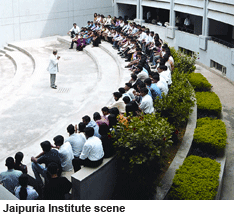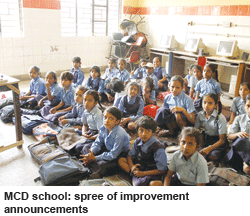Privately promoted B-schools countrywide offering postgraduate diplomas in management (PGDM — considered equivalent to an MBA degree programme which can be offered only by University Grants Commission-approved universities) inched a step closer to financial autonomy on July 10. Delivering an interim order in AICTE vs. Education Promotion Society for India, Associ-ation of Indian Management Schools & Jaipuria Group of Institutions (Writ petition No. 219 of 2011), a Supreme Court bench comprising Justice P.M. Lodha and Anil R. Dave stayed a notification dated December 28, 2010 issued by the All India Council for Technical Education (AICTE).
 In the impugned notification, AICTE, which licenses and regulates all institutions of technical education including 1,600 accredited B-schools, empowered state governments to prescribe admission norms and adjudicate tuition fees of all AICTE-accredited B-schools within their geographical jurisdiction. The apex court’s stay order has evoked a collective sigh of relief from B-school managements. This is the fourth (interim) stay order obtained by B-schools which had obtained similar interim orders in March 2011, July 2011 and March 2012.
In the impugned notification, AICTE, which licenses and regulates all institutions of technical education including 1,600 accredited B-schools, empowered state governments to prescribe admission norms and adjudicate tuition fees of all AICTE-accredited B-schools within their geographical jurisdiction. The apex court’s stay order has evoked a collective sigh of relief from B-school managements. This is the fourth (interim) stay order obtained by B-schools which had obtained similar interim orders in March 2011, July 2011 and March 2012.
Following the latest order, private B-schools can admit students who perform upto their expectations in CAT (Common Admission Test conducted by the Indian Institutes of Management); MAT (Management Aptitude Test of the All-India Management Association); XAT (Xavier Aptitude Test of the Xavier’s Labour Relations Institute, Jamsh-edpur), ATMA (test of the Manage-ment Association of Indian Management Schools), and CMAT (Common Manag-ement Admission Test conducted by AICTE).
 The Supreme Court’s latest order has also raised the petitioners’ optimism about the final verdict (date undecided) completely restoring the autonomy of private B-schools which is currently under threat. “AICTE should focus on detecting and rooting out malpractices in technical and management education rather than infringing upon the right conferred upon private unaided professional colleges to devise their own transparent and merit-based admission systems and levy reasonable tuition fees commensurate to invest-ment, by the Supreme Court’s verdicts in the T.M.A Pai Foundation and P.A. Inamdar cases. Anyway all B-schools are required to renew their accreditation every year. Therefore if a B-school indulges in malpractice, AICTE can refuse to renew accreditation,” says Dr. J.D. Singh, director general, Jaipuria Institute of Management (estb.1995), which has four campuses in Jaipur, Lucknow, Indore and Noida with a total headcount of 1,300 students.
The Supreme Court’s latest order has also raised the petitioners’ optimism about the final verdict (date undecided) completely restoring the autonomy of private B-schools which is currently under threat. “AICTE should focus on detecting and rooting out malpractices in technical and management education rather than infringing upon the right conferred upon private unaided professional colleges to devise their own transparent and merit-based admission systems and levy reasonable tuition fees commensurate to invest-ment, by the Supreme Court’s verdicts in the T.M.A Pai Foundation and P.A. Inamdar cases. Anyway all B-schools are required to renew their accreditation every year. Therefore if a B-school indulges in malpractice, AICTE can refuse to renew accreditation,” says Dr. J.D. Singh, director general, Jaipuria Institute of Management (estb.1995), which has four campuses in Jaipur, Lucknow, Indore and Noida with a total headcount of 1,300 students.
However Prof. S.S. Mantha, chairman of AICTE, justifies the council’s December 28, 2010 notification as being necessary in the public interest. “All institutes offering professional educ-ation programmes are subject to supervision by state governments, or the affiliating university or both. However, B-schools are not subject to supervision by either. This is a funda-mental error which AICTE attempted to correct by issuing the notification,” says Mantha.
But while acknowledging the supervision and regulation of AICTE, private B-school promoters argue that B-schools tend to be pan-India instit-utions with broad perspectives attra-cting students from across the country. Therefore, they should not be subject to interference by state governments.
Education Promotion Society for India (EPSI, a consortium of more than 300 B-schools, estb. 2005), another petitioner, is also upbeat about the interim order of the apex court. “The court accepted this argument and queried why a super-visory regulatory system which has been functioning smoothly for over two decades needs to be changed,” says Dr. Harivansh Chaturvedi, alternate president of EPSI.
Sushma Berlia, president of Apeejay Stya University (estb.2010) which is a member of EPSI, acknowledges AICTE’s supervisory role over accredited B-schools. “We welcome and respect all regulatory guidelines issued by the AICTE. But the right to determine our own fair and transparent admission system and levy reasonable tuition fees are fundamental rights confirmed by the Supreme Court. AICTE cannot delegate these fundamental rights to state governments,” says Berlia.
However while there is considerable jubilation within the ountry’s private B-schools, it is pertinent to note that the Supreme Court has issued another interim order, not the final word of the apex court. While the auguries are good, the best news is still to come.
Vimal Chander Joshi (Delhi)
National disgrace
After its sweeping election victory in all three newly trifurcated municipal corporations of Delhi (North Delhi, South Delhi and East Delhi) in April, the Bharatiya Janata Party (BJP) has been on a spree of announcements promising to improve standards of education in 1,729 Municipal Corporation of Delhi (MCD)-run primary schools with an aggregate enrolment of 1 million children.
On July 17, it launched an initiative christened Gyan Dhara Abhiyan (‘knowledge stream campaign’), a three-year project to provide basic facilities such as libraries, sports infrastructure, special teachers, clean toilets and potable water in all MCD-run schools, to which end the NGO Room to Read and several unnamed corporate houses have been roped in. “There is a very negative perception about the quality of education imparted in government schools with many parents preferring to enroll their children in fees-charging private schools rather than free-of-charge government schools. We want to get rid of such misconceptions,” says MCD education committee chairman Rekha Gupta.
 However, judging by the BJP’s track record of improving teaching-learning standards in MCD schools since 2007 — when it first came to power in the MCD — the chances of the party fulfilling this promise are slim. During its five-year rule (2007-2012), this political party with right-wing leanings has succeeded in dumbing down standards in MCD schools.
However, judging by the BJP’s track record of improving teaching-learning standards in MCD schools since 2007 — when it first came to power in the MCD — the chances of the party fulfilling this promise are slim. During its five-year rule (2007-2012), this political party with right-wing leanings has succeeded in dumbing down standards in MCD schools.
According to a recently released survey conducted by well-known non-government organisation CRY (Child Rights and You), basic facilities such as clean drinking water (students have been given water bottles to bring water from their homes), qualified teachers, spacious classrooms, clean toilets etc are missing in most MCD schools. In fact, in December last year 58 MCD schools were declared unfit to function and had to be closed. Recently in June, two MCD school buildings collapsed. Moreover, the teacher-pupil ratio is skewed with some schools having 75 students cramped into one class, and special educators required to meet the needs of 2,100 challenged children, are still to be recruited.
With MCD schools in such dismal condition, it’s quite obvious the allocation of Rs.537 crore made in MCD’s budget for education towards the construction of buildings, installing fire fighting equipment, buying new desks, has not been utilised for the purpose and has vanished into the pockets of councillors.
The condition of the 924 primary-secondaries run by the Congress party-led state government for more than a decade (since 1998) is no better. As per the CRY report, all government schools are plagued with chronic shortages of potable water, teachers, infrastructure etc. The lack of basic facilities is adversely affecting the learning outcomes of public schools in the national capital. And instead of utilising allocated funds to upgrade and improve conditions in their own schools, the state government and MCD have been exhibiting greater enthusiasm to enforce the admission of children from under-privileged households into private primaries — as stipulated by s.12 (1) (c) of the Right of Children to Free and Compulsory Education Act, 2009.
“All statements and resolutions of intent of the state and local govern-ments to improve primary education are just political posturing. They don’t pay any attention to their own schools, in fact they don’t even start schools in areas which need them, unless pulled up by a court. If the BJP intends to upgrade the quality of MCD schools, why didn’t its councillors do anything during their previous term? Unless we have sincere governments with the political will to ensure a secure future for children who have no option but to attend these schools, there’s not much hope,” says advocate-activist Ashok Agarwal, convenor of Delhi-based NGO Social Jurist.
MCD allocated Rs.1,107 crore to education in its budget for 2011-12 and the Delhi state government Rs,1,247 crore. Impressive sums no doubt. If only they were utilised for the purpose intended, government schools in Delhi wouldn’t be a national disgrace.
Swati Roy (Delhi)